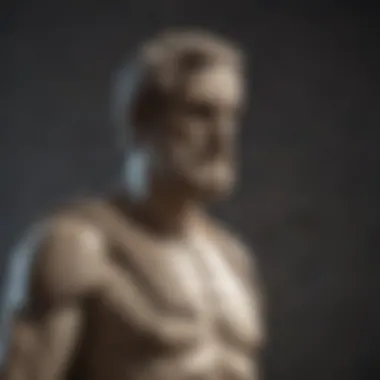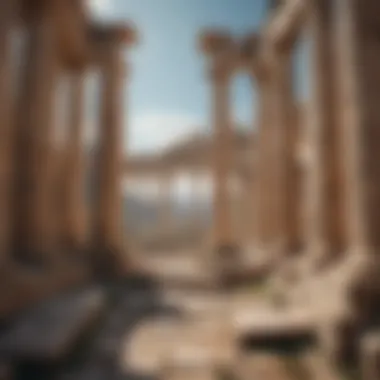Exploring Plato's Timeless Wisdom: Essential Books for In-Depth Philosophical Insights


Book Title and Author Introduction
Plato's 'The Republic' is a foundational work in philosophy written by the renowned ancient Greek philosopher, Plato. Born in Athens, Plato was a student of Socrates and the teacher of Aristotle. 'The Republic' delves into the concept of justice, the ideal state, and the role of individuals within society, exploring profound themes of ethics, morality, and governance.
Summary of Book Content
'The Republic' presents Socrates' dialogue with various interlocutors discussing the definition of justice, the elements of the ideal state, and the theory of Forms. Through allegories such as the Allegory of the Cave, Plato examines the nature of reality, knowledge, and the philosopher-king's role in leading a just society.
Three Lessons Learned
- Lesson 1: The importance of seeking knowledge and truth even when it challenges conventional beliefs, as truth leads to enlightenment and personal growth.
- Lesson 2: The significance of an individual's ethical conduct in shaping a just society, highlighting the interplay between personal virtues and the common good.
- Lesson 3: The essence of governance based on meritocracy and the idea of philosopher-kings ruling with wisdom and reason for the betterment of society.
Practical Applications
The lessons from 'The Republic' can be applied in contemporary settings, such as fostering critical thinking in decision-making, promoting ethical leadership in organizations, and advocating for merit-based governance in political structures. By understanding and implementing the principles outlined in the book, individuals can contribute to building a more just and harmonious society.
Introduction to Plato
Delving into the world of Plato and his essential works is a profound journey that offers timeless insights into philosophy, ethics, and human nature. The introductory section sets the stage for understanding the depth and relevance of Plato's ideas, providing a foundational understanding for readers eager to explore ancient philosophical thought. Exploring Plato's essential books is not just a scholarly pursuit but a gateway to unraveling the core of human existence through the lens of one of history's greatest thinkers.
Understanding Plato's Influence
Impact of Plato on Western Philosophy
Plato's influence on Western philosophy is monumental, shaping the very essence of philosophical thought for centuries. His introduction of the Theory of Forms revolutionized the way philosophers approached concepts of reality and existence. Exploring Plato's impact offers insight into the origins of many philosophical frameworks prevalent today, demonstrating his enduring relevance in intellectual discourse.
Relevance of Plato's Ideas Today
Plato's ideas continue to resonate in modern society, guiding contemporary discussions on ethics, politics, and metaphysics. His exploration of justice, virtue, and the nature of reality remains foundational in addressing fundamental questions about human existence. Understanding the relevance of Plato's ideas today provides a roadmap for applying ancient wisdom to contemporary challenges, highlighting the timelessness of his philosophies.
Brief Biography of Plato
Early Life and Education


Plato's early life and education significantly shaped his philosophical pursuits, laying the groundwork for his intellectual development. Growing up in ancient Greece amidst political and philosophical ferment, Plato's formative years instilled in him a deep curiosity and critical thought that would characterize his later works. Exploring Plato's early experiences offers a glimpse into the influences that molded one of history's most influential philosophers.
Philosophical Contributions
Plato's philosophical contributions encompass a vast array of topics, from metaphysics to ethics, with each discourse offering profound insights into the human condition. His dialogues, such as 'The Republic' and 'Phaedo,' delve into themes of justice, knowledge, and the nature of reality, challenging readers to contemplate the fundamental aspects of life. Examining Plato's philosophical oeuvre illuminates his enduring impact on the development of philosophical thought.
Legacy of Plato
Plato's legacy extends far beyond his own time, inspiring generations of thinkers to grapple with complex philosophical questions. His emphasis on critical inquiry and rational discourse laid the foundation for Western philosophical traditions, influencing intellectual movements for centuries to come. Exploring Plato's legacy enables readers to appreciate the profound impact of his ideas on subsequent philosophical developments, underscoring his enduring significance in the annals of intellectual history.
Key Themes in Plato's Works
Plato's works are renowned for delving deep into essential philosophical themes that continue to resonate through the centuries. Understanding these key themes is crucial for anyone seeking to grasp the essence of ancient philosophical thought. In this article, we will unravel the profound concepts that Plato explores in his writings, shedding light on the timeless wisdom embedded within.
The Theory of Forms
Definition and Significance
The Theory of Forms propounded by Plato is a fundamental concept that underpins his entire philosophical framework. This theory asserts that the material world is but a shadow or reflection of the true reality, which exists in the realm of forms. The significance of this theory lies in its challenge to conventional notions of reality and truth, inviting contemplation on the nature of existence and knowledge. By immersing ourselves in Plato's Theory of Forms, we can gain profound insights into metaphysics and epistemology, enriching our understanding of the world.
Implications on Ethics and Metaphysics
Plato's Theory of Forms has far-reaching implications for ethical inquiry and metaphysical speculation. The separation of the material world from the realm of forms raises pertinent questions about the nature of virtue, justice, and the ultimate good. This philosophical framework shapes Plato's ethical theories, emphasizing the pursuit of transcendent ideals and the cultivation of moral virtues. Furthermore, in the realm of metaphysics, the Theory of Forms prompts reflection on the nature of reality and the structures that underpin existence, urging us to contemplate the relationship between the physical and abstract dimensions of reality.
Justice and Virtue
Exploration of Justice in 'Republic'
Plato's exploration of justice in his seminal work 'Republic' delves into the complexities of governance, individual morality, and societal harmony. Through dialogues and nuanced arguments, Plato unravels the intricacies of justice, proposing an ideal state governed by philosopher-kings. The exploration of justice in 'Republic' challenges conventional beliefs about governance and ethics, inviting readers to reconsider the nature of justice and its implications for society.
Concept of Virtue in Platonic Dialogues
Within the intricate web of Platonic dialogues, the concept of virtue emerges as a central theme that permeates discussions on ethics and human excellence. Plato's emphasis on the cultivation of virtues such as wisdom, courage, temperance, and justice underscores the importance of moral character in the pursuit of the good life. By examining the concept of virtue in Platonic dialogues, readers are prompted to reflect on their own ethical aspirations and the role of virtue in shaping individual conduct and communal relationships.
The Allegory of the Cave


Interpretation and Symbolism
Plato's Allegory of the Cave serves as a powerful allegorical narrative that elucidates the journey from ignorance to enlightenment. The allegory symbolizes the human condition, depicting individuals chained in a cave, mistaking shadows for reality. Through philosophical introspection and intellectual liberation, individuals can break free from the confines of ignorance and ascend towards the realm of true knowledge. The interpretation and symbolism embedded within the Allegory of the Cave invite profound reflection on the nature of perception, truth, and enlightenment.
Relevance in Modern Thought
Despite being composed centuries ago, the Allegory of the Cave maintains its relevance in modern thought, resonating with contemporary discussions on education, consciousness, and societal awareness. The allegory's depiction of ignorance and enlightenment transcends historical contexts, offering timeless insights into the pursuit of knowledge and the liberation of the mind. By exploring the allegory's contemporary relevance, readers can unearth the enduring relevance of Plato's allegorical storytelling and its implications for today's intellectual discourse.
Recommended Plato Books
Exploring the essential Plato books is a crucial endeavor in gaining a profound understanding of ancient philosophical thought. By delving into Plato's works, readers can immerse themselves in a world of timeless wisdom and deep insights. The recommended Plato books serve as the gateway to exploring philosophy, ethics, and human nature, delivering profound reflections on the fundamental aspects of existence. These books are a treasure trove of knowledge and offer a profound glimpse into the intellectual prowess of one of history's greatest philosophers.
The Republic
Overview of the Dialogue
The value of 'The Republic' lies in its profound exploration of justice, virtue, and the ideal society. Through Socrates' dialogues, Plato presents a visionary utopia where justice reigns supreme, challenging readers to reflect on the nature of governance and morality. The dialogue's distinctive feature is its structured argumentation, encompassing various forms of government and the characteristics of a just ruler. This narrative choice allows readers to contemplate different societal models and fosters critical thinking about the underlying principles of a harmonious community.
Key Concepts Explored
The key themes in 'The Republic' encapsulate Plato's views on justice, education, and the role of individuals within the state. Through concepts like the Allegory of the Cave and the analogy of the divided line, Plato delves into the nature of reality and the ascent towards philosophical enlightenment. By deciphering these complex allegories, readers can grasp profound insights into ethics, metaphysics, and the desirable traits of an enlightened society. 'The Republic' stands as a cornerstone in Plato's corpus, inviting readers to ponder the essence of justice and the implications of moral principles on a societal scale.
Phaedo
Discussion on Immortality of the Soul
In 'Phaedo,' Plato engages in a profound discussion on the immortality of the soul, elucidating the eternal nature of human consciousness. By linking the soul's immortality to philosophical contemplation and the pursuit of wisdom, Plato offers readers a profound perspective on life, death, and the transcendental essence of the human spirit. This exploration serves as a cornerstone in metaphysical philosophy, encouraging readers to reflect on the eternal aspect of the human psyche and its implications on ethical conduct and personal growth.
Plato's Theory of Knowledge
Plato's theory of knowledge in 'Phaedo' delves into the epistemological foundations of reality and the nature of true understanding. By delineating the distinction between opinion and true knowledge, Plato challenges readers to reassess their perceptions of reality and the validity of sensory experience. Through the concept of recollection and the theory of forms, Plato elevates knowledge to a transcendent realm, emphasizing the importance of intellectual inquiry and dialectical reasoning. 'Phaedo' emerges as a testament to Plato's philosophical acumen, inviting readers to contemplate the nature of knowledge and the eternal quest for truth.
Symposium


Exploration of Love and Beauty
In 'Symposium,' Plato delves into the multifaceted nature of love and beauty, presenting a nuanced exploration of human emotions and desires. Through a series of speeches by various characters, Plato unveils the diverse manifestations of love, ranging from physical attraction to spiritual transcendence. This profound reflection on the complexities of desire and beauty invites readers to ponder the nature of relationships, aesthetics, and the pursuit of ultimate truths. 'Symposium' offers a captivating glimpse into the intricacies of human passion and the significance of love in shaping individual destinies.
Speeches by Various Characters
The varied speeches by different characters in 'Symposium' enrich the dialogue by offering contrasting perspectives on love and beauty. Each speech contributes unique insights into the nature of desire, shedding light on the diverse interpretations of love across different individuals. Through this polyphonic narrative structure, Plato underscores the subjective nature of emotions and the multifaceted dimensions of human affections. The speeches in 'Symposium' not only highlight the complexities of love but also underscore the inherent diversity of human experiences and perceptions, fostering a nuanced understanding of emotional bonds and aesthetic appreciation.
Apology
Defense of Socrates' Life and Actions
In 'Apology,' Plato presents Socrates' defense against the accusations of impiety and corrupting the youth, illustrating the philosopher's unwavering commitment to truth and moral integrity. Through a meticulous exploration of Socrates' reasoning and ethical conduct, Plato showcases the profound impact of philosophical inquiry on individual beliefs and societal norms. The defense of Socrates' life and actions serves as a poignant reminder of the perennial struggles faced by truth-seekers in a world filled with ignorance and prejudice.
Philosophical Teachings
The philosophical teachings conveyed in 'Apology' embody Socrates' dedication to questioning assumptions, challenging societal conventions, and seeking wisdom amid adversity. Through Socratic dialogues and dialectical examinations, Plato emphasizes the transformative power of philosophical inquiry in shaping personal convictions and ethical frameworks. The enduring legacy of Socrates' teachings in 'Apology' underscores the eternal relevance of critical thinking and intellectual courage in navigating the complexities of human existence. 'Apology' stands as a testament to the enduring importance of moral courage and intellectual honesty in the pursuit of truth.
Reading and Understanding Plato
In the vast landscape of philosophical thought, understanding Plato remains a cornerstone for anyone delving into ancient wisdom. The ability to decipher and appreciate Plato’s dialogues is crucial in unraveling the intricate layers of his ideas. With Plato's works serving as timeless beacons of intellectual exploration, delving into the depths of his writing offers a profound insight into the origins of Western philosophy. Reading and understanding Plato's texts unveils a panorama of ethical considerations, metaphysical inquiries, and reflections on human nature. This article aims to equip readers with the necessary tools and insights to navigate through the profound complexities of Plato's philosophical works.
Approaching Plato's Dialogues
Analytical Tools for Interpretation
Analyzing Plato's dialogues requires a nuanced approach that involves leveraging analytical tools tailor-made for interpreting ancient philosophical texts. These tools serve as guiding compasses in unraveling the rich tapestry of ideas woven into Plato's works. By dissecting the dialogues with precision and depth, readers can uncover hidden layers of meaning, grasp intricate arguments, and appreciate the dialectical method employed by Plato. The ability to decode Plato's philosophical puzzles enriches the reading experience, providing a deeper comprehension of his enduring insights. While these analytical tools demand a systematic and meticulous approach, they reward readers with profound intellectual stimulation and a heightened appreciation for classical philosophical thought.
Navigating Complex Philosophical Ideas
Navigating through Plato's profound exploration of complex philosophical ideas necessitates a keen intellectual acumen and a capacity for deep contemplation. The intricacies embedded within Plato's dialogues challenge readers to grapple with abstract concepts, ethical dilemmas, and metaphysical conundrums. By navigating these intricate philosophical terrains, readers can enhance their critical thinking skills, cultivate a nuanced understanding of ancient thought, and draw parallels between Plato's worldview and contemporary discourse. While the journey through Plato's philosophical landscape may be intellectually demanding, the rewards of mastering complex ideas are boundless, fueling a profound appreciation for the depth and breadth of philosophical inquiry.
Interpreting Plato's Philosophy
Contextual Understanding
Interpreting Plato's philosophy necessitates a comprehensive grasp of the historical, cultural, and intellectual context in which his ideas germinated. Contextual understanding serves as a cornerstone for unraveling the core tenets of Plato's philosophy, shedding light on the influences shaping his worldview and the conversations engaging ancient Greek thought. By situating Plato's dialogues within their contextual framework, readers can glean insights into the socio-political milieu of ancient Athens, the intellectual milieu of the Academy, and the discourses animating philosophical debates of that era. Contextual understanding acts as a bridge connecting modern readers to the vibrant intellectual tapestry of ancient Greece, fostering a deeper appreciation for the enduring relevance of Plato's philosophical insights.
Modern Applications
The relevance of Plato's philosophy transcends the confines of ancient Greece, resonating with contemporary readers through its timeless wisdom and enduring relevance. By applying Plato's philosophical insights to modern contexts, readers can extract valuable lessons, draw parallels between ancient and contemporary moral dilemmas, and engage critically with the perennial questions animating human existence. The modern applications of Plato's philosophy extend to diverse fields such as ethics, politics, education, and metaphysics, offering a rich tapestry of ideas to navigate the complexities of the modern world. Embracing Plato's philosophy in a contemporary context enriches intellectual discourse, cultivates moral reflection, and stimulates a robust engagement with the perennial inquiries that define the human condition.







